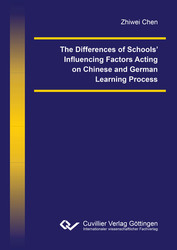| Fachbereiche | |
|---|---|
| Buchreihen (96) |
1381
|
| Nachhaltigkeit |
3
|
| Gesundheitswesen |
1
|
| Geisteswissenschaften |
2369
|
| Medienwissenschaften | 16 |
| Theologie | 57 |
| Philosophie | 102 |
| Rechtswissenschaft | 423 |
| Wirtschaftswissenschaften | 851 |
| Sozialwissenschaften | 417 |
| Sportwissenschaften | 48 |
| Psychologie | 233 |
| Pädagogik | 190 |
| Geschichtswissenschaften | 183 |
| Kunstwissenschaften | 111 |
| Kulturwissenschaften | 166 |
| Literaturwissenschaften | 117 |
| Sprachwissenschaften | 88 |
| Naturwissenschaften |
5408
|
| Ingenieurwissenschaften |
1795
|
| Allgemein |
98
|
|
Leitlinien Unfallchirurgie
5. Auflage bestellen |
|
Erweiterte Suche
The Differences of Schools’ Influencing Factors Acting on Chinese and German Learning Process
Zhiwei Chen (Autor)Vorschau
Inhaltsverzeichnis, PDF (50 KB)
Leseprobe, PDF (97 KB)
This researching is mainly focusing on the lifelong biographical experiences by different persons in China and Germany. The main researching method is biographical methods (Alheit 2009, S. 116) which take use of the interviews contents to do further and deeper analysis for the certain topics and themes. For this research, I have selected more than 20 interviewees in each country, with different social or learning background, and most of them could represent some certain kinds of groups in the society. With these interviewees, I have made interviews about their whole life process, especially the learning experiences and feelings until nowadays. Some of the narrative and interviewing contents are much more representative than others as they can stand for a different kind of learning and thinking type influencing by the schools learning factors and affairs, as well as the relating factors and materials. Therefore, from all the interviews, I have further selected 6 narrative contents in each country to make the comparison as follows. Each narration is a typical learning thought and idea which could be classified into a certain kind of social group. With the analyzing method and the basic notions of grounded theory (Alheit 1999, S. 1-19), this research has also made analysis based on the history, culture, law system, educational institutions, politician, social environment, etc. for each interview. The findings and researching results can offer new viewpoints and notions on the schools’ influences and effects on learning motivations, behaviors, activities and even the lifelong learning process.
| ISBN-13 (Printausgabe) | 9783736991095 |
| Buchendformat | A5 |
| Sprache | Englisch |
| Seitenanzahl | 228 |
| Umschlagkaschierung | matt |
| Auflage | 1. Aufl. |
| Erscheinungsort | Göttingen |
| Erscheinungsdatum | 18.09.2015 |
| Allgemeine Einordnung | Dissertation |
| Fachbereiche |
Pädagogik
|








